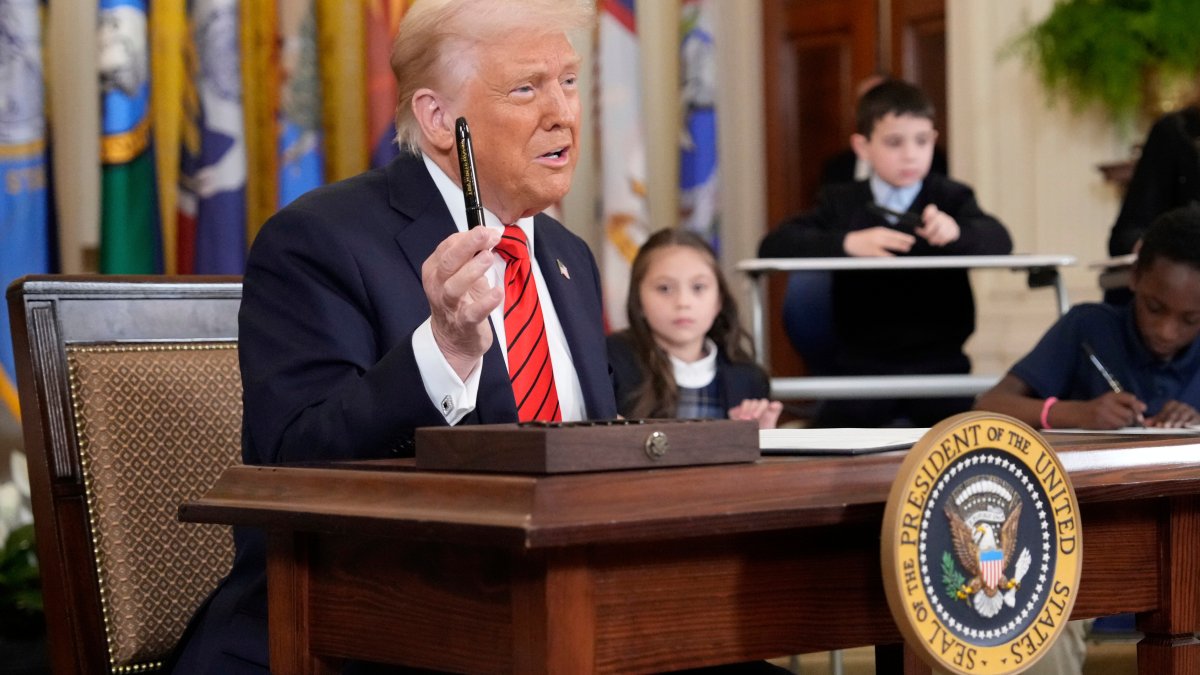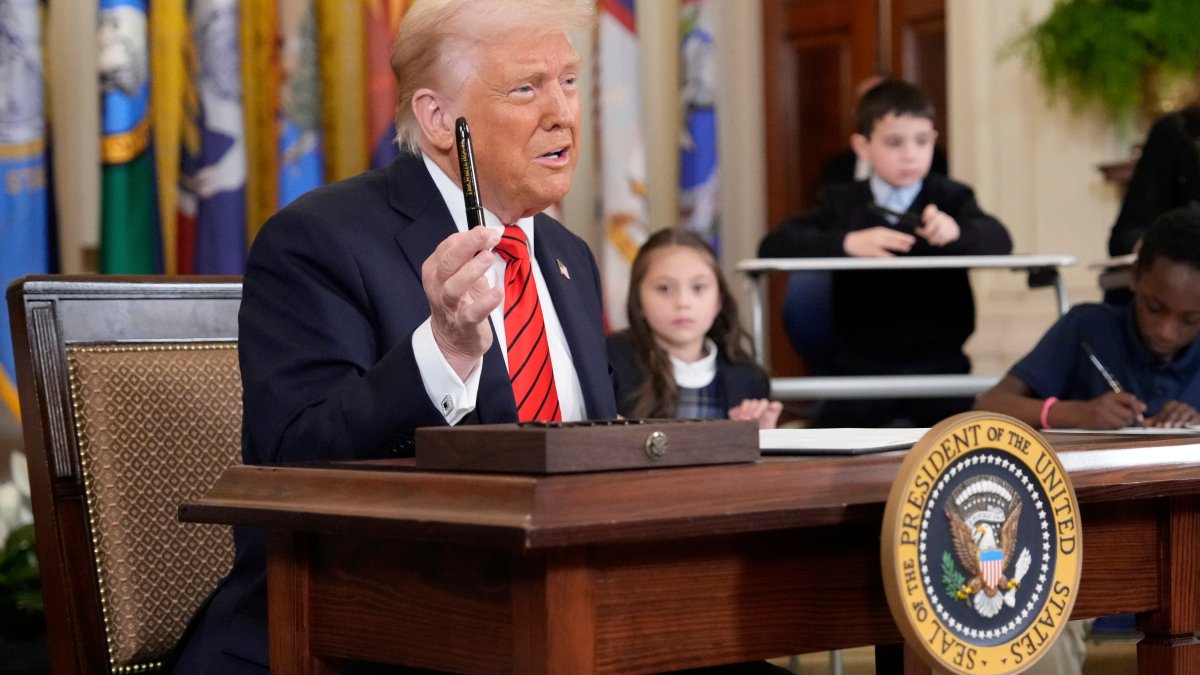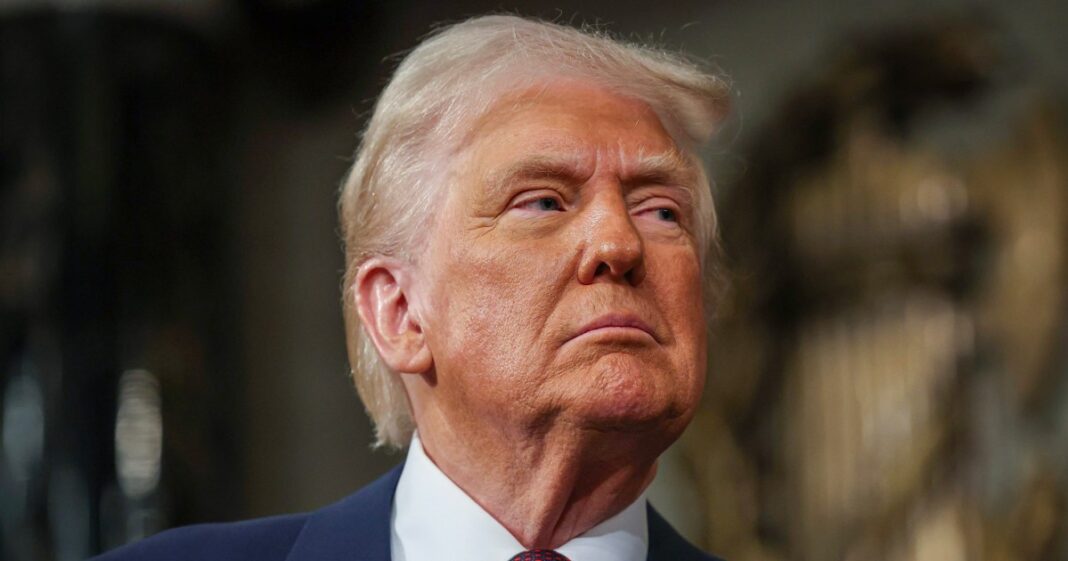## A Hammer to the Foundations: Trump Orders Education Department’s Dismantling
Brace yourselves. The Trump administration is preparing to unleash another seismic shift in American public life, this time targeting the very foundation of our nation’s educational system.
In a move that promises to ignite fierce debate and potentially reshape the landscape of education for generations to come, President Trump is set to announce the dismantling of the Education Department at a White House event, according to NBC News. This bold declaration, coming at a time when educational inequalities are already starkly exposed, raises a multitude of questions about the future of public education, the role of federal oversight, and the very essence of American opportunity.

Collaboration with Congress: A Necessary but Uncertain Path

While President Trump has signaled his intention to dismantle the Education Department through an executive order, the reality of such a drastic move hinges on Congressional approval. Historically, the Education Department has enjoyed bipartisan support, highlighting the complex political landscape surrounding this initiative.
The President’s executive order, while symbolically significant, primarily serves as a directive to Secretary of Education Linda McMahon to initiate the dismantling process. The legal framework for formally dissolving the department necessitates Congressional action. Given the contentious nature of the proposal, securing the necessary legislative support is a formidable challenge for the Trump administration.
The President’s characterization of teachers unions as the primary obstacle to his plan underscores the political complexities involved. While some lawmakers may align with the President’s vision of reducing federal influence in education, others, particularly Democrats, are likely to vehemently oppose any attempt to dismantle an agency they view as essential to ensuring educational equity.
The path forward remains uncertain. The Trump administration will need to engage in a sustained and strategic lobbying effort to garner sufficient Congressional support. This could involve negotiating with lawmakers across the aisle, seeking compromises, and highlighting the perceived benefits of reducing bureaucratic inefficiencies.

A Political Power Play: Musk’s Unconventional Influence
Elon Musk’s Backing of Trump’s Agenda and the “Department of Government Efficiency”
Elon Musk, the tech entrepreneur and CEO of Tesla and SpaceX, has emerged as an unlikely but influential figure in the Trump administration. His substantial financial contributions to the 2024 election and his active role in shaping the President’s agenda have raised questions about the extent of his political influence.
Musk’s unwavering support for Trump’s vision of a smaller, more efficient government has positioned him as a key advisor on matters related to bureaucratic streamlining. He has been instrumental in the creation of a task force known as the “Department of Government Efficiency,” tasked with identifying and eliminating perceived redundancies and inefficiencies within federal agencies.
Financial Muscle: Propping Up Loyalists and Shaping the Political Landscape
Musk’s immense wealth, estimated to be in the tens of billions of dollars, has translated into significant political spending. He has channeled his resources through a super PAC he founded, making it the leading outside spender in key races, including the upcoming Wisconsin Supreme Court election. This financial muscle allows him to exert considerable influence over the political landscape.
Beyond direct campaign contributions, Musk’s financial support extends to rewarding political allies. He has been known to bestow financial favors upon lawmakers who align with his views, potentially influencing their legislative decisions and solidifying his political network.
Musk as a Political Force: A Megadonor with Unprecedented Reach
Musk’s emergence as a major political player marks a departure from traditional donor dynamics. His unprecedented financial capacity, combined with his prominent platform on social media, grants him an unparalleled ability to shape public discourse and influence political outcomes.
His willingness to engage directly in political battles, often through provocative social media posts, further amplifies his voice and underscores his intention to be a force to be reckoned with in the political arena.
The Implications: A Threat to Educational Equity?
Potential Consequences for Public Education Access and Funding
The Trump administration’s proposal to dismantle the Education Department has sparked widespread concern about the potential impact on public education. Critics argue that eliminating the department would result in a significant reduction in federal funding for education, disproportionately affecting low-income schools and students.
The department plays a crucial role in setting national education standards, distributing federal funding, and enforcing civil rights laws in schools. Its dismantling could lead to a patchwork of state-level education policies, potentially exacerbating existing inequalities and undermining the quality of education for millions of children.
Concerns about the Impact on Vulnerable Student Populations
Vulnerable student populations, including students of color, students with disabilities, and English language learners, are particularly at risk if the Education Department is dismantled. These students often rely on federal programs and support services to access quality education.
Without the oversight and guidance of the federal government, there is a heightened risk of these vulnerable students being left behind. States may prioritize funding for certain student populations over others, leading to further inequities in educational opportunities.
Long-Term Consequences for the Future of Education Policy
The dismantling of the Education Department would have profound long-term consequences for the future of education policy in the United States. It would signal a significant shift in the role of the federal government in education, potentially ushering in an era of greater state control and autonomy.
This shift could have both positive and negative implications. On the one hand, it could empower states to tailor education policies to the specific needs of their communities. On the other hand, it could lead to a decline in national educational standards and a widening of the achievement gap between students from different socioeconomic backgrounds.
Conclusion
A New Era of Uncertainty: The Trump Administration’s Education Department Dismantling
In a shocking revelation, the Trump administration is set to unveil a plan to dismantle the Education Department, marking a seismic shift in the nation’s education policy landscape. As reported by NBC News, the President is poised to deliver the bombshell announcement at a White House event, sending shockwaves through the education community. The key takeaways from this development are stark: the proposed dismantling of the Education Department would not only restructure the department but also transfer its responsibilities to other agencies, effectively gutting a vital component of the federal government’s education infrastructure. Critics argue that this move would be a grave mistake, threatening the stability and progress made in education reform.
The implications of this decision are far-reaching and unsettling. For one, it would undermine the federal government’s commitment to education, leaving vulnerable populations such as low-income students, students with disabilities, and English language learners without a dedicated advocate. Moreover, the dismantling of the Education Department would embolden state and local governments to pursue their own agendas, potentially leading to a patchwork of inequitable policies that would exacerbate existing educational disparities. As the nation grapples with the consequences of this decision, we are reminded that education is not just a policy issue but a fundamental human right.
As the Trump administration takes this drastic step, we are left to ponder the future of education in this country. Will this move mark the beginning of a new era of federal inaction, leaving students and educators to fend for themselves? Or will it spark a national conversation about the role of government in education, ultimately leading to a more robust and inclusive system? One thing is certain: the dismantling of the Education Department is a wake-up call for all of us to reexamine our values and priorities when it comes to education. The future of our nation’s youth hangs in the balance.
